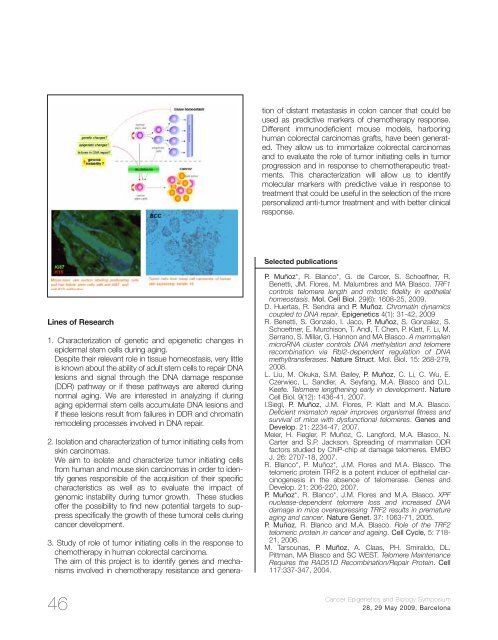PEBC Report - Programa de Epigenética y BiologÃa del Cáncer
PEBC Report - Programa de Epigenética y BiologÃa del Cáncer
PEBC Report - Programa de Epigenética y BiologÃa del Cáncer
Create successful ePaper yourself
Turn your PDF publications into a flip-book with our unique Google optimized e-Paper software.
tion of distant metastasis in colon cancer that could be<br />
used as predictive markers of chemotherapy response.<br />
Different immuno<strong>de</strong>ficient mouse mo<strong>de</strong>ls, harboring<br />
human colorectal carcinomas grafts, have been generated.<br />
They allow us to immortalize colorectal carcinomas<br />
and to evaluate the role of tumor initiating cells in tumor<br />
progression and in response to chemotherapeutic treatments.<br />
This characterization will allow us to i<strong>de</strong>ntify<br />
molecular markers with predictive value in response to<br />
treatment that could be useful in the selection of the more<br />
personalized anti-tumor treatment and with better clinical<br />
response.<br />
Selected publications<br />
Lines of Research<br />
1. Characterization of genetic and epigenetic changes in<br />
epi<strong>de</strong>rmal stem cells during aging.<br />
Despite their relevant role in tissue homeostasis, very little<br />
is known about the ability of adult stem cells to repair DNA<br />
lesions and signal through the DNA damage response<br />
(DDR) pathway or if these pathways are altered during<br />
normal aging. We are interested in analyzing if during<br />
aging epi<strong>de</strong>rmal stem cells accumulate DNA lesions and<br />
if these lesions result from failures in DDR and chromatin<br />
remo<strong>de</strong>ling processes involved in DNA repair.<br />
2. Isolation and characterization of tumor initiating cells from<br />
skin carcinomas.<br />
We aim to isolate and characterize tumor initiating cells<br />
from human and mouse skin carcinomas in or<strong>de</strong>r to i<strong>de</strong>ntify<br />
genes responsible of the acquisition of their specific<br />
characteristics as well as to evaluate the impact of<br />
genomic instability during tumor growth. These studies<br />
offer the possibility to find new potential targets to suppress<br />
specifically the growth of these tumoral cells during<br />
cancer <strong>de</strong>velopment.<br />
3. Study of role of tumor initiating cells in the response to<br />
chemotherapy in human colorectal carcinoma.<br />
The aim of this project is to i<strong>de</strong>ntify genes and mechanisms<br />
involved in chemotherapy resistance and genera-<br />
P. Muñoz*, R. Blanco*, G. <strong>de</strong> Carcer, S. Schoeffner, R.<br />
Benetti, JM. Flores, M. Malumbres and MA Blasco. TRF1<br />
controls telomere length and mitotic fi<strong>de</strong>lity in epithelial<br />
homeostasis. Mol. Cell Biol. 29(6): 1608-25, 2009.<br />
D. Huertas, R. Sendra and P. Muñoz. Chromatin dynamics<br />
coupled to DNA repair. Epigenetics 4(1): 31-42, 2009<br />
R. Benetti, S. Gonzalo, I. Jaco, P. Muñoz, S. Gonzalez, S.<br />
Schoeftner, E. Murchison, T. Andl, T. Chen, P. Klatt, F. Li, M.<br />
Serrano, S. Millar, G. Hannon and MA Blasco. A mammalian<br />
microRNA cluster controls DNA methylation and telomere<br />
recombination via Rbl2-<strong>de</strong>pen<strong>de</strong>nt regulation of DNA<br />
methyltransferases. Nature Struct. Mol. Biol. 15: 268-279,<br />
2008.<br />
L. Liu, M. Okuka, S.M. Bailey, P. Muñoz, C. Li, C. Wu, E.<br />
Czerwiec, L. Sandler, A. Seyfang, M.A. Blasco and D.L.<br />
Keefe. Telomere lengthening early in <strong>de</strong>velopment. Nature<br />
Cell Biol. 9(12): 1436-41, 2007.<br />
I.Siegl, P. Muñoz, J.M. Flores, P. Klatt and M.A. Blasco.<br />
Deficient mismatch repair improves organismal fitness and<br />
survival of mice with dysfunctional telomeres. Genes and<br />
Develop. 21: 2234-47, 2007.<br />
Meier, H. Fiegler, P. Muñoz, C. Langford, M.A. Blasco, N.<br />
Carter and S.P. Jackson. Spreading of mammalian DDR<br />
factors studied by ChiP-chip at damage telomeres. EMBO<br />
J. 26: 2707-18, 2007.<br />
R. Blanco*, P. Muñoz*, J.M. Flores and M.A. Blasco. The<br />
telomeric protein TRF2 is a potent inducer of epithelial carcinogenesis<br />
in the absence of telomerase. Genes and<br />
Develop. 21: 206-220, 2007.<br />
P. Muñoz*, R. Blanco*, J.M. Flores and M.A. Blasco. XPF<br />
nuclease-<strong>de</strong>pen<strong>de</strong>nt telomere loss and increased DNA<br />
damage in mice overexpressing TRF2 results in premature<br />
aging and cancer. Nature Genet. 37: 1063-71, 2005.<br />
P. Muñoz, R. Blanco and M.A. Blasco. Role of the TRF2<br />
telomeric protein in cancer and ageing. Cell Cycle, 5: 718-<br />
21, 2006.<br />
M. Tarsounas, P. Muñoz, A. Claas, PH. Smiraldo, DL.<br />
Pittman, MA Blasco and SC WEST. Telomere Maintenance<br />
Requires the RAD51D Recombination/Repair Protein. Cell<br />
117:337-347, 2004.<br />
Cancer Epigenetics and Biology Symposium<br />
46 28, 29 May 2009, Barcelona


